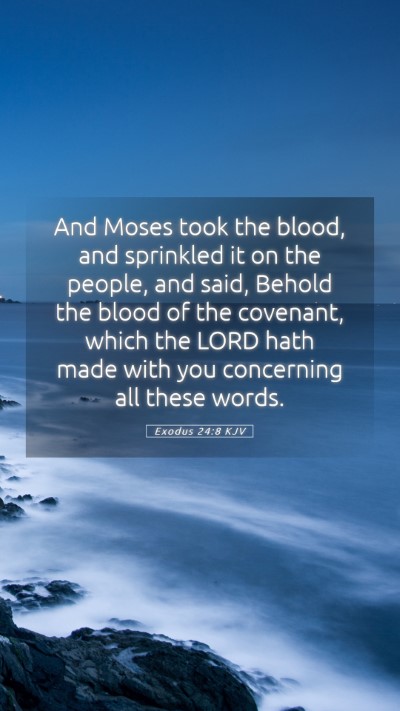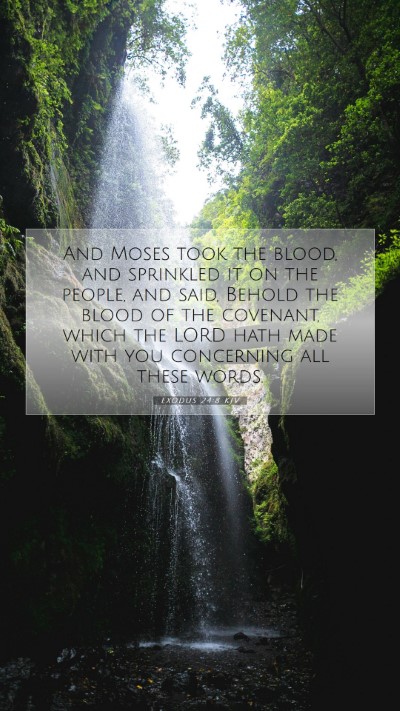Understanding Exodus 24:8: A Comprehensive Commentary
Bible Verse: Exodus 24:8 - "And Moses took the blood, and sprinkled it on the people, and said, Behold the blood of the covenant, which the Lord hath made with you concerning all these words."
Overview of Exodus 24:8
Exodus 24:8 serves as a pivotal moment in Scripture, symbolizing the establishment of a covenant between God and the people of Israel. This verse encapsulates themes of sacrifice, commitment, and divine relationship.
Insights from Biblical Commentaries
-
Matthew Henry:
Henry highlights that the act of sprinkling blood signifies the seriousness of the covenant and the commitment required from the people of Israel. Blood, in this context, represents the life force and the sealing of promises. He notes that this moment points forward to Christ's sacrifice, which ultimately seals a new covenant with believers.
-
Albert Barnes:
Barnes emphasizes the covenant’s importance by explaining the significance of blood in biblical terms. He explains that the sprinkling of blood served as a divine confirmation that binds the people to God, showing the gravity of their obligations under the covenant established through the laws given to Moses. The phrase "the blood of the covenant" signifies not only the terms set but also the cost associated with breaking the covenant—a theme of immense significance throughout Scripture.
-
Adam Clarke:
Clarke's analysis reveals the deeply rooted symbolism of blood shedding in the context of the sacrificial system. He interprets the act as indicative of the people's acceptance of God’s laws and stipulations. Clarke also mentions that this event serves as a foreshadowing of Christ's ultimate sacrifice, where His blood would establish a new covenant for humanity, emphasizing continuity in the biblical narrative regarding God's plan for redemption.
The Significance of Blood in Covenant Theology
The blood referenced in Exodus 24:8 is significant not only for the Israelites but for all of Scripture. It represents:
- Life and Sacrifice: Blood symbolizes life, and its shedding is often associated with sacrifice. The covenant sealed with blood implies great cost and commitment.
- Divine Relationship: Conditions of the covenant signify a binding relationship between God and His people, wherein both parties have roles and responsibilities.
- Foreshadowing of Christ: The sprinkling of blood serves as a poignant foreshadowing of Jesus Christ's atoning sacrifice as mentioned in the New Testament, thereby bridging the Old and New Covenants.
Applications for Today's Believers
Understanding Exodus 24:8 sheds light on key applications for contemporary faith communities:
- Covenantal Living: Believers are called to value their covenant with God and live lives consistent with His commandments.
- Christ’s Sacrifice: Reflection on this verse encourages acknowledgment of the significance of Jesus’ sacrificial death and its relevance in personal lives.
- Commitment to God’s Word: This exhortation underlines the importance of engaging with Scripture, understanding its implications, and applying its truths within the community and personal contexts.
Cross References
Exodus 24:8 is related to several other Scriptures that illuminate its theological implications:
- Matthew 26:28 - Jesus speaks of His blood shed for many, establishing a new covenant.
- Hebrews 9:20 - Discusses Moses' action of sprinkling blood in the context of the covenant.
- 1 Corinthians 11:25 - Paul reiterates the significance of the cup, representing the new covenant in Christ's blood.
Final Thoughts
Exodus 24:8 is a vital scripture for understanding the nature of God’s covenants. It invites believers to recognize their place in the rich tapestry of salvation history and encourages them to reflect on how these historical events shape their faith today. The themes of sacrifice, responsibilities in covenant relationships, and the foreshadowing of Christ's ultimate sacrifice deepen believers' understanding of Scripture and inspire them to engage with their faith, making it relevant in their daily lives.


